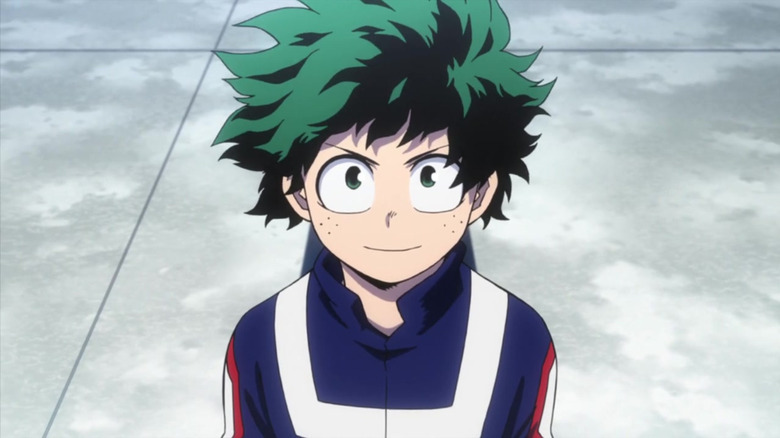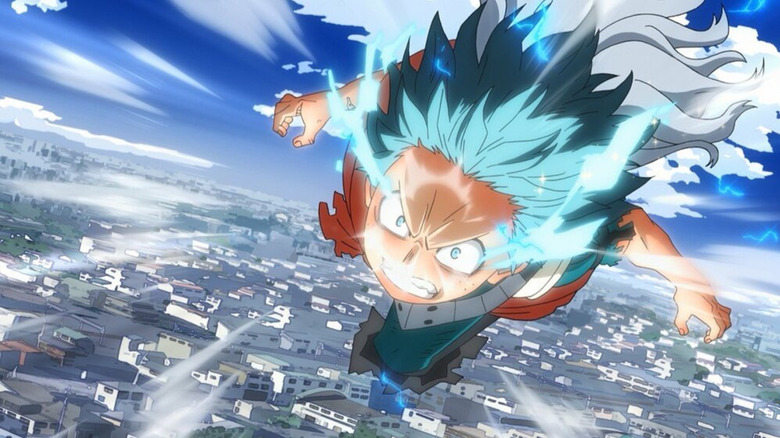The Live-Action My Hero Academia Movie Could Buck The Most Troubling Trend In Adapting Anime Stories
Adapting anime into live-action has always been a hard venture to undergo. Not only are some stories just better suited for the medium of animation, but many well-known mangas and animes are stories whose inspirations cannot be fully appreciated outside of a Japanese context. When given an American or otherwise Western makeover, the impact of these stories is often drastically reduced, resulting in less-than-faithful adaptations. We've seen this with various different Western live-action adaptations, from the hollowness of "Death Note" to the insensitivity of "Ghost in the Shell."
When it was announced back in 2018 that Legendary Entertainment had acquired the rights to the popular "My Hero Academia" franchise for a new live-action film, many fans were understandably worried. Would Izuku Midoriya, the franchise's main character, turn into Ian Michaels or something similar for this new film? Would U.A. High School be relocated to California and be populated by mostly white people? While the manga and anime were based on American comic books, stripping away all references to its Japanese origins would make the "My Hero Academia" film just another Western superhero movie.
However, with the news that Netflix has officially boarded the project, The Hollywood Reporter teased that this might not be the case. The trade seemed to hint that the "My Hero Academia" film will focus on casting Japanese-American actors to fill the roles of beloved characters like Ochaco Uraraka, Shoto Todoroki, and Toshinori Yagi. If true, this could be a pivotal turning point for manga and anime adaptations.
Obtaining the One For All of anime adaptations
As previously stated, attempting to be more universal and less distinctly Japanese has been the Achilles heel of many Western live-action anime adaptations. In their attempts to cater to as many Americans as possible, the original source material gets so glossed over that all of the property's original charm is gone. Take, for example, 2021's critically-panned "Cowboy Bebop" and how its over-reliance on the show's Western influences ended up taking precedence over all other aspects of its production. If "My Hero Academia" does end up casting Japanese-American and/or English-speaking Japanese actors, that could mean that the film could maintain the original's balance between Western influences and Japanese culture.
While the film will be written by British screenwriter Joby Harold, there is one other key name involved in the production that could also signal a push towards this non-Westernized version of "My Hero Academia." It was announced back in 2021 that Shinsuke Sato will be making his English directorial debut with the adaptation (via Deadline), and that is actually a pretty major deal. Sato has directed numerous manga and anime adaptations in Japan (including 2015's "I Am a Hero" and 2018's "Bleach"), many of which have been praised for their balance between honoring the source material and reimagining it for live-action. Perhaps most important to this story is his work on the Netflix adaptation of "Alice in Borderland," which could explain why the streamer decided to board the project.
Can we really trust this?
While it would be nice to see the "My Hero Academia" film be populated with actors of Japanese heritage, it's also hard not to be skeptical. No matter who is at the helm creatively, Hollywood will do whatever Hollywood wants to do – in this case, casting prominent white actors in order to appeal to more people. The problem with this, of course, is that it will only drive fans, both hardcore and casual, away from the film, thus causing other potential viewers to not care all that much.
Perhaps the only way to approach this film is with cautious optimism. So far, the stars seem to be aligning for the project, but you also never know what changes and mandates Netflix or Legendary might impose. Perhaps they'll try to play that "all-Asian casts can't make money" card or something else to justify the casting of white people. While disappointing, it wouldn't be surprising, but it's also important to keep optimism afloat in case an effort is actually going to be made. It's like the classic saying goes: hope for the best, prepare for the worst.


